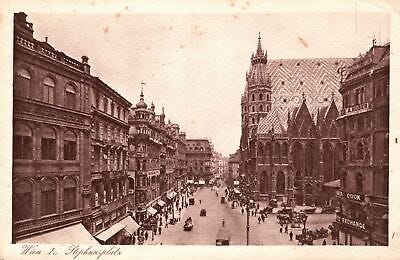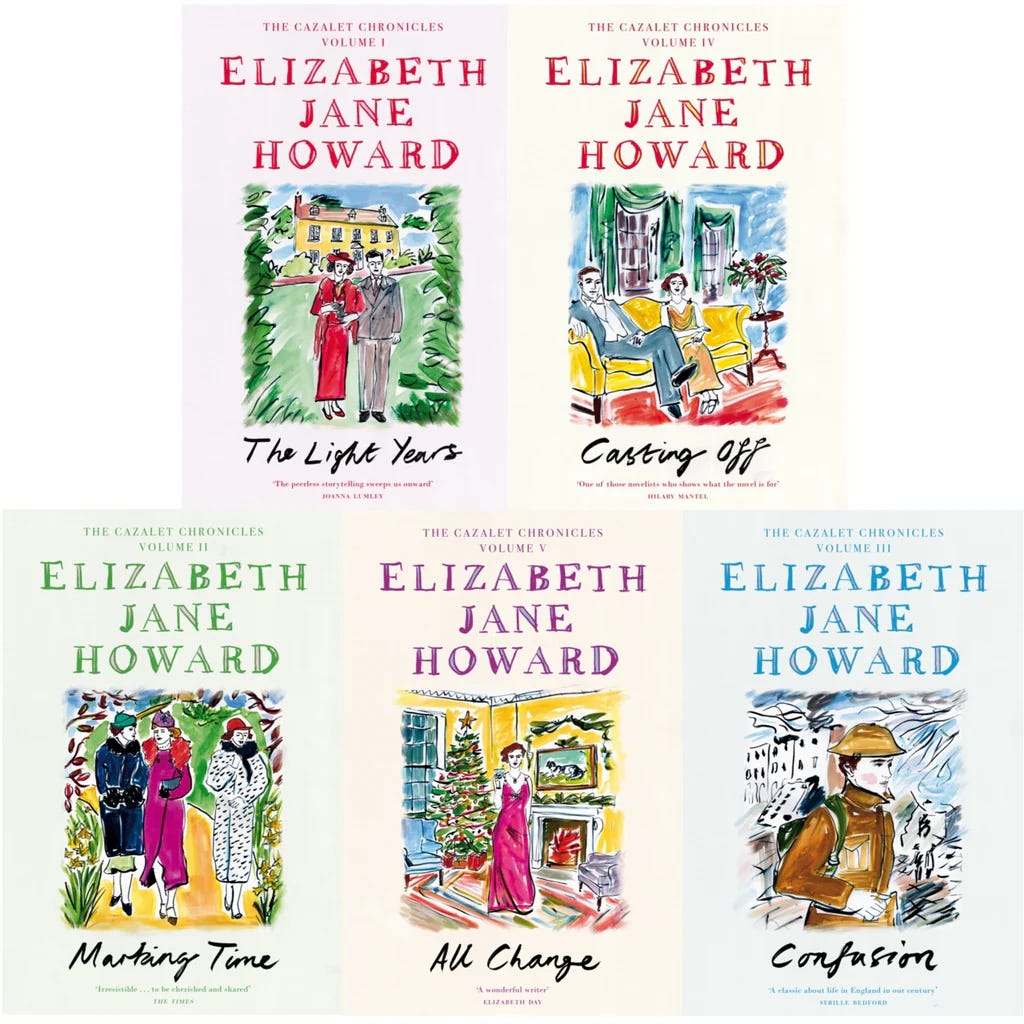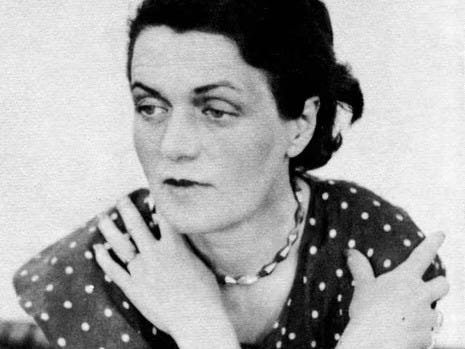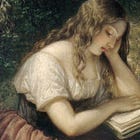Herstory Recap #1: Everything I Read in June
Historical fiction. Feminist nonfiction. Reading plans that went off the rails.
How I envisioned my June reading—and how it actually went—were two very different things.
I had an overly ambitious TBR planned for the Historical Fiction Readathon I was co-hosting with four other lovely Booktubers, but I barely made a dent in it. I fully intended to finish reading Sarah Waters’ backlist as part of my Pride Month reading, but my Libby loan expired and there was a queue for it, so that hope was dashed. And nowhere on my June TBR would you have found nonfiction, yet it ended up making up half of what I read.
So while this wrap-up includes a few surprises, I can’t say that I’m mad about it.
I did read two historical fictions, one of which has been a NRN (not right now) more than once. It turns out that June was finally the right time for me to sit down with The Light Years, Book 1 of the Cazalet Chronicles. The other title was All of You Every Single One, an LGBTQ+ love story, that delivered a shocking plot twist that made up for my lack of Sarah Waters this month. And hey, at least I succeeded in participating in the readathon I was co-hosting (you only needed to read one).
The nonfiction books that I read, though, were interesting additions. Apparently, I was in a certain kind of mood because both books ended up paralleling each other. Each—feminist in tone—examined, in its own way, the cultural stories that have shaped how women are perceived, written about, and move through the world.
All in all, June threw me a bit of a curveball but, like I said, I’m not mad about it. There might have been nonfiction detours and a handful of books left unread, but there weren’t any real flops. I mostly enjoyed what I read and have found some new rabbit holes to go down.
Stacked: What I Read
A rundown of the books that made me think, feel, or rage-underline.
A History of Women in 101 Objects - Annabelle Hirsch
All of You Every Single One - Beatrice Hitchman
Cassandra Speaks - Elizabeth Lesser
The Light Years - Elizabeth Jane Howard
A History of Women in 101 Objects - Annabelle Hirsch
In A History of Women in 101 Objects, Annabelle Hirsch uses a collection of commonplace objects to reveal the often overlooked history of women’s lived experiences, from prehistory to the present day. The objects speak to the intimate aspects of women’s lives: their bodies, art, ideologies, sexuality, rights, and roles within the family and society. But, beyond that, the items confront and then dispel the vilifying myths used to control and undermine women.
Told in chronological order, each object is covered in a short essay that feels as though it could stand alone. In the audiobook, an ensemble cast of women including Margaret Atwood, Helen Mirren, Cynthia Eviro, Nicola Sturgeon, and Elizabeth Acevedo narrate each essay.
Unsurprisingly, certain curiosities resonated with me more than others. The Lilith Amulet, which told the story of biblical Adam’s first wife, and how she was demonized for daring to think herself a man’s equal, made me question a childhood filled with religion classes. The torturous thumbscrew, used to extract the “truth” during the witch trials and, infamously, in Baroque artist Artemisia Gentileschi’s rape trial, filled me with the female rage that many of Gentileschi’s most famous paintings depict. The hatpin, a seemingly innocuous accessory, became a weapon for women to defend themselves from street harassment. The so-called “hatpin peril” was depicted in caricatures, with men skewered by them. Still, I can’t say that there was a single artifact whose story didn’t pique my interest, even marginally.
But if you’re looking for a comprehensive history, you’ll find yourself disappointed. This book serves more as a history sampler that allows you to discover time periods, women, or cultural movements that interest you, and then sends you on your merry way. And while the chronological structure of the book makes sense logically, I found myself wishing for a more thematic grouping of objects to help the book feel less disjointed and, perhaps, lead to a deeper, more nuanced exploration of the nonlinear history of women.
All of You Every Single One - Beatrice Hitchman
A found family historical fiction set in Vienna, All of You Every Single One brings together a cast of queer individuals who converge in the Jewish neighborhood of Leopoldstadt between 1910 to 1946.
Based on the book jacket, you’d expect this novel to predominantly focus on Julia, an unhappily married Swedish woman who runs away with her lover, Eve, a female tailor with a penchant for menswear. You might also assume that there’s only one other major storyline: that of Ada Bauer, a patient of Sigmund Freud. But the book is far more complex than that with multiple perspectives—ten or so—who experience romantic, platonic, and familial love while the world is shifting violently around them. The relationships are often complex, sometimes heartwarming and other times fraught.
The number of perspectives and ambitious timeline—thirty-six years, spanning peacetime, World War I, the interwar years, and World War II—make this a difficult book to summarize. But what stood out most for me was the richness of its LGBTQ+ cast. Their friendships reminded me of other iconic friend groups, like Friends, Girls, Sex and the City, and How I Met Your Mother, by capturing the camaraderie, messiness, and intimacy that define chosen families.
Hitchman also delivered some wonderfully unexpected plot twists that stressed me out as a reader. Predictable, it was not.
Still, despite my desire to love this book, it didn’t quite hit the mark in a few key areas. While certain perspectives—Julia, Eve, Rolf, Elsa—felt fully-formed and emotionally resonated with me, others felt underdeveloped and more like plot devices, appearing and then disappearing once they’d served their purpose. The pacing, too, was uneven. A handful of years took sixty percent of the novel to cover, and a twenty-five year time jump made World War I nothing but a blip. The section that focused on Nazism and World War II, though tense and chilling at times, felt rushed by comparison.
And then there’s the ending. With such high stakes and the devastation of war surrounding these characters, the conclusion felt too neat for my liking and as if Hitchman was afraid of upsetting her readers. I wanted something more in line with the emotional and historical weight the novel had built. Instead, it ended up feeling romance-novel-adjacent—not that I have anything against a good romance—but in this context, it felt like a tonal mismatch.
Cassandra Speaks - Elizabeth Lesser
Have you ever wondered what origin stories, myths, or religious parables would look like if they’d been written by women instead of men? In Cassandra Speaks: When Women Are the Storytellers, the Human Story Changes, Elizabeth Lesser analyzes the stories that have shaped our culture and defined the way we value gender.
Lesser examines how tales like biblical Eve and mythological Pandora have cemented blame on women, figuring them as the source of evil and suffering. She moves throughout history, showing how male storytellers have denigrated women at best and erased them at worst. Meanwhile, masculine traits like dominance and conquest are glorified again and again. Consider how many statues of male warriors exist and how few celebrate the accomplishments of women. Think about the pervasiveness of masculine-coded metaphors in our daily speech, especially those borrowed from war: “make a killing,” “set your sights on,” “battlefield,” “retreat,” “mission critical,” “debriefing,” “war room.”
It was these powerful observations that gave me pause. I found myself trying Lesser’s challenge: to go a single day without using military metaphors. I failed, miserably.
When she turns her gaze towards leadership, Lesser argues that power is still masculine-coded. Men are encouraged to leave their mark as public leaders—heads of state, titans of business, disruptors—while women are often relegated into private caregiving roles. The idea that leadership might also include traits like empathy, collaboration, or care still feels radical.
That, to me, is where Cassandra Speaks is strongest. She identifies patterns we’ve never been taught to notice because they are so intrinsic to our cultural identity (Western culture, specifically), and then asks provocative questions that linger.
But when the book shifts towards the self-help and spiritual realm it loses me. Lesser introduces meditation practices and what she calls “innervision,” a more metaphysical approach to change-making and feminism. I grudgingly accepted the self-reflection in small doses, but I connected far less with the spiritual pivot than the more analytical content. That said, Cassandra Speaks may resonate more with readers who enjoy a blend of feminist inquiry and personal growth.
The Light Years - Elizabeth Jane Howard
The first book in a sweeping historical fiction series, The Light Years tells the story of the Cazalets, an upper-middle-class English family on the eve of World War II. As tradition dictates, each summer the three Cazalet brothers, their wives, and children descend upon the country estate, Home Place, where their aging parents and unmarried sister live with the household staff. The novel focuses primarily on the two “idyllic” summers—1937 and 1938—during the months when Neville Chamberlain and much of Europe are trying to avoid war with Germany.
The Lights Years is a character-driven novel told from the perspectives of what has to be two dozen characters: the Cazalet adults, the children, the staff, and a few tertiary characters. It centers around evolving family dynamics as the children grow, marriages strengthen or falter, and characters come to understandings or find themselves at odds with one another. Think Downton Abbey or Upstairs, Downstairs. But if you’re looking for a plot-driven narrative with major events and dramatic turns, I would suggest that you look elsewhere.
Impressively, Howard manages to create unique voices within this sprawling family tree, which only grows as the novel progresses. The internal dialogues are often more captivating than what is said. Viola (or Villy), Edward Cazalet’s wife, tugged at my heartstrings with her dissatisfaction with her married life and Puritanical views on sex. She’s juxtaposed with Zoe, Rupert Cazalet’s young second wife. These contrasts pop up throughout the family—Edward and Hugh, Christopher and Teddy, Sidney and Rachel—highlighting the ideological tensions of the 1930s and bringing the virtues and vices of each character into sharper focus.
While I thoroughly enjoyed the novel and plan to pick up the second installment, Marking Time, I will be the first to admit that nothing happens. It’s a quiet book, the epitome of cozy. Despite the looming threat of another world war and the enduring trauma of the last one, the story feels surprisingly low stakes. Small, trivial conflicts resolve themselves, while deeper tensions simmer beneath the surface, clearly to be addressed in a later installment.
What struck me, though, was the waiting. There is a strange, restless stasis that mirrors the “will he or won’t he” speculation surrounding Chamberlain and Hitler. Preparations are made: the relatives are brought to the estate, cots are ordered, evacuation plans for the nearby baby home are discussed. But still nothing happens. Life continues in the extraordinarily mundane way it does, which is exactly the point.
So yes, although nothing happens, I still enjoyed this 500+ page novel about family life. It’s comfortingly uneventful with an ensemble of characters that feels lived-in and (mostly) endearing. Elizabeth Jane Howard’s writing is beautiful, if sometimes verbose—there are sentences that stretch over more than a page—but her characters are what makes the novel compelling. They’re the reason I’ll keep reading.
Footnotes from Herstory
One forgotten woman who deserves a main character moment.
Caresse Crosby (1892-1970)
Discovering Caresse Crosby feels delectably naughty. How had no one bothered to tell me about this woman who defied literally every expectation? She didn’t just invent the modern bra; she also published the early works of Ernest Hemingway, James Joyce, and Anaïs Nin through the Black Sun Press, which she founded with her husband Harry. What captivated me most, though, was her audacity.
She once arrived at a party topless on an elephant (or so they say). She named her dog Clytoris. She wrote erotica, hosted opium-laced salons where monogamy was optional, and turned a crumbling Italian castle into an artist commune. She lived a life of excess, but also one of vision.
So, my question is where is the mini-series or novel about her? And does this mean that I now need to write one?
On My Radar
The rabbit holes calling my name—aka what I’ll probably obsess over next month.
Kingmaker - Sonia Purnell - The 2024 biography about Winston Churchill’s daughter-in-law, who is often remembered as a 20th century courtesan. I’m only 20% into the audiobook but already feel the injustice of that characterization.
Briefly, A Delicious Life - Nell Stevens - The story of a teenaged ghost who falls in love with George Sand, and a novel I’m stoked to read. It’s been on my TBR pile for far too long, and was one of the historical fiction books I didn’t get to in June.
My Mother’s Wedding - As a Kristin Scott Thomas fan, I’m dying to see her directorial debut, also starring Scarlett Johansson, Sienna Miller, and Emily Beecham as her daughters. The film revolves around three daughters who are brought together for their mother’s third wedding.
Downton Abbey: The Grand Finale - The way I gasped during the trailer to see Lady Mary kicked out of a society party for being divorced. I’ve been equal parts excited and heartbroken to see Downton come to an end.
Outrageous - The Mitford sisters. That is all.
Your Turn, Reader
Now it’s your turn to spill.
Are you a mood reader or a planner? And how often does your reading go exactly as planned?
Do you gravitate toward books quiet books? Or do you need plot with a capital P?
What’s one book you’ve been meaning to read forever but keep pushing off?
In Case You Missed It
Wishing you the company of a good book,
Brittany












